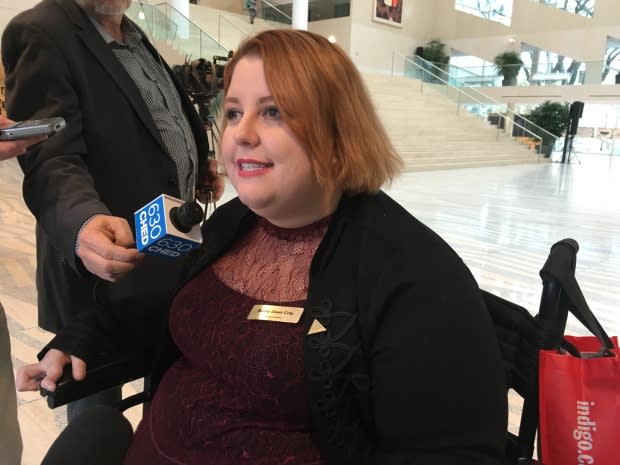DATS needs $2.25 million to improve bus service, Edmonton councillors told
As Edmonton's population grows and ages, so does the demand for regular and special transit service for people with limited mobility.
City council will be asked to fund another $2.25 million for DATS, a door-to-door pre-booked service for people with physical and cognitive challenges. The funding request is expected to come next month.
It currently costs the city about $30 million a year to operate the service.
Eddie Robar, manager of Edmonton Transit Service, told council's executive committee Monday that $1 million is needed to address requests during peak periods and $1.2 million is needed to address the growing demand.
"Any given day there is less capacity to accommodate same-day trip request," Robar told the committee. "Every year, Edmonton's population not only continues to grow but also age. With this comes a steady upward pressure on DATS."
Riders must book in advance and with the current capacity of the fleet and drivers, only two per cent of the rides are same-day trips.
About 10,000 Edmontonians are registered clients of DATS. About 215 are registered to use the service only in the winter.

Bailey Coty, a student at MacEwan University, said the strict service parameters make it difficult getting to get to class on time.
"It's just really frustrating to me as a disabled person, trying to live a life as most of us do, and it's frustrating because DATS just won't budge."
Coty said she'd like to see a mobile app that tracks the real-time location of the bus, instead of waiting 30 minutes without knowing when they'll arrive.
"In the winter, it's hard. It's hard to go and get in my wheelchair and wait outside."
Coty said relying on DATS means she's missed classes or been late and had to cancel medical appointments.

"If I can't rely on transportation myself, it's nearly impossible to do things."
In March, Coun. Bev Esslinger asked city administration for a report and cost estimates of improving the service.
She noted that a large portion of Edmonton residents are affected.
"They're struggling to get to work, to get to university, to get to their appointments and I don't think we ever meant that they would have less of quality of life," she told committee. "So we need to work through some of the challenges, we have to engage them in the conversation."
Other options
Bonnie Dobbs, professor dept of family medicine at University of Alberta, said other cities have improved the efficiency of DATS by using ride scheduling software and apps.
While in the U.S., cities are using ride-sharing companies like Uber or Lyft, Canadian cities are using taxis.
Drive Happiness, a volunteer-based not for profit group that transports seniors with mild mobility issues in Edmonton, said they're also willing to partner with the city to enhance ride service.
The city's operations branch will return in November with the request for $2.25 million for improved service. They're also being asked to outline alternative service providers, such as taxis and Uber.
